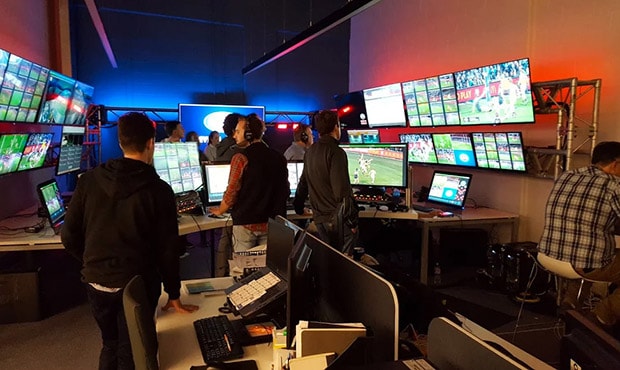A CENTRALISED review system was successfully used in the second half of the Port Adelaide and Richmond clash at the Adelaide Oval on Friday night, and will be rolled out in the coming weeks.
In the bowels of Etihad Stadium, a team of officials operated 25-30 screens to analyse goal review decisions when called for by the umpire, and also check every goal while the ball was being sent back to the centre square.
It was fully operational in the second half, after a minor communication issue caused the officials to err on the side of caution and not use the system in Melbourne to make decisions in the first half. Instead, the normal review system in place at Adelaide Oval was used.
Port storm past Tigers to rekindle finals hopes
Through the entire testing period, the match venue will have capabilities to conduct reviews in case any issues arise with centralised system.
The League’s football operations manager Mark Evans told AFL.com.au the system had worked well, without being overly tested on Friday night.
"The Melbourne review centre had control in the second half," Evans said.
"They did all of the 'silent' reviews but no official review came up, unfortunately.
"It all went well."
Silent reviews are those conducted after each goal as part of standard procedure, to determine whether there was an umpiring error.
The system was used officially in the St Kilda v Geelong match at Etihad Stadium last Saturday, after a trial on the preceding Thursday for the Adelaide v North Melbourne game.
Matches at Etihad Stadium are able to use cables to send the vision to the centralised review system. While that isn’t possible for matches held at other grounds, the feed is still at the bunker within 0.1 of a second.
Football operations boss Mark Evans said the system would involve initial set-up costs but would work out cheaper in the long run.
"You might be able to provide a better centralised service because you can have greater training and greater experience in a few operators, rather than the many that you need around the country," Evans said.
"(Also) you don't need to fly as many officials around the country if you can solve that problem."
The system could have multiple uses in the future, such as:
- Catching any incidents where a player receives a hit to the head and may have been concussed
- Recording match-day vision for clubs, rather than obtaining it through the venue
- Finding vision to be used for umpire training
- Information regarding statistics and player tracking
Below: The centralised review system at Etihad Stadium in action Monitoring of concussion would not be done by a doctor, but by someone trained to notice potential head clashes, with the time of the incident passed on to doctors at the venue to see if a test is necessary.
Monitoring of concussion would not be done by a doctor, but by someone trained to notice potential head clashes, with the time of the incident passed on to doctors at the venue to see if a test is necessary.
"It's not diagnosed at all (in the centralised review space), but it's just to point out where there is some vision that the reviewer thinks the doctor should see," Evans said.
He said being able to make prompt decisions was critical to the process.
"Our game doesn't like being held up for a long period of time. Other codes seem to accept that a review can take a number of minutes. We prefer ours to be done inside 30 seconds," he said.
"We certainly don't intervene on anything other than scores, and we don't even hold up behinds if it hasn't been called for by central umpires."


